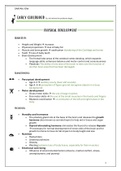DARYAN.VDW
EARLY CHILDHOOD So, this where the problems begin…
PHYSICAL DEVELOPMENT
CHANGES IN:
• Height and Weight à increase
• Physical proportions à loss of baby fat
• Muscle and bone growth à ossification (hardening of the Cartlidge and bone)
• Teeth à loss of baby teeth
• Brain development
• The frontal lobe areas of the cerebral cortex develop, which expands
language skills, enhances balance and motor control and consciousness
• Plasticity (The ability of one area of the brain to take over the function of
another brain area that has been damaged)
Characteristics:
• Perceptual development
• Age 2-3 à auditory acuity (hear soft sounds)
• Age 4- 6 à perception of figure-ground (recognise objects in a busy
background)
• Motor development
• Gross motor skills à the use of large muscles
• Fine motor skills à the use of the small muscles in the hands and fingers
• Bilateral coordination à co-ordination of the left and right halves in the
body
Influences:
• Heredity and hormones
• The pituitary gland sits at the base of the brain and releases the growth
hormone (also known as somatotropin) to help aid in tissue and organ
growth
• thyroid-stimulating hormone stimulates the thyroid to release thyroxiǹ
à necessary for normal development of nerve cells of the brain and for
growth hormone to have its full impact on body height and size
• Nutrition
• Malnutrition
• Undernourishment
• Obesity
• Wasting (extreme loss of body tissue, especially for their muscles)
• Emotional well-being
• Influence of environmental factors (divorce, martial conflict, stress,
unemployment, and poverty)
1
,DARYAN.VDW
• Psychosocial/deprivation dwarfism (delayed physical growth as result of
stress and emotional deprivation)
• Stress on hormones, digestion and the immune system à negative
impacts
COGNITIVE DEVELOPMENT
THEORIES OF COGNITIVE DEVELOPMENT:
PIAGET’S THEORY: PREOPERATIONAL STAGE (2-6/7 YEARS)
• Preoperational thinking à illogical thinking - cannot engage in mental
operations
• Symbolic/pre-conceptual period (2-4 years) à complex symbols – attach
meaning to words, numbers and images
• Intuitive period (4-7 years) – children so sure of their world and what they know
however can’t tell you how they’ve come to know or what exactly they know à
primitive reasoning
• Advances of pre-operational thought
• Deferred imitation (the ability to repeat the behaviour of a model that is
no longer present)
• Symbolic play/pretend play (substituting imaginary situations for real
ones)
• Spoken language à thinking occurs through representation of actions
thus children have the ability to understand the symbolic meanings of
the words
• Immature aspects of pre-operational thought
• Perception-bound thinking (solve problems based on what stands out
vividly and perceptually.
• Irreversibility (cannot reverse an operation)
• Perceptual centration (can only reason about one dimension at a time)
• Egocentrism (believe that others think, feel and perceive in the same
way as they do)
• Animism (believe that inanimate objects have feelings)
• Transductive reasoning (reason from event to event rather than in a
more logical fashion)
• By the end of the pre-operational period, children should be able to classify
and categorise objects but they are not capable of multiple classification
and do not have a number concept
• Evaluation
• Animism is of too small a degree
• pre-schoolers are able to display empathy and
• awareness of how other people feel
• Number concept and ability to classify develops earlier than Piaget
assumed
2
, DARYAN.VDW
NEO-PIAGETIANS
• Theorist who have expanded on Piaget’s work
• Kurt Fischer’s viewpoint
• Agrees that cognitive development is an action based, self-regulating,
constructive process but he disagrees that there is a generalised
cognitive structure
• Cognitive development must be described for each task and in a different
context
• Cognitive development needs support from environment, higher levels
of support leads to higher cognitive performance
• Robbie Case’s viewpoint
• Thinking develops in stages and is influenced by executive processing
space (active, temporary conscious memory)
• Operational efficiency à Limit to the number of schemas that children
can attend to in this space at any one time
• improvement occurs through practice and brain maturation
NAÏVE THEORIES
• Children as theorists à theories are not created by specialists and aren’t
scientific but help to understand new experience and predict future events
• Core knowledge hypothesis (children are born with very basic knowledge of
the world, which grows as children have new experiences)
• Naïve physics (understanding of objects and properties)
• Naïve biology (understanding about the distinction between animate and
inanimate objects - motion)
• 4yrs old ToB (properties associated with living objects): Movement,
Growth, Internal parts, Inheritance, Healing
• Naïve psychology (individuals’ tendencies to try and explain why people act as
they do)
• Henry Wellmen
• First phase, 2yrs oldsà aware of and can communicate desires and link
their desires to their behaviours
• Second phase, 3yr olds à clearly distinguish mental and physical world
and can use mental verbs (think, believe, remember etc)
• Third phase, 4yrs olds à understand their own and others’ actions and
understand that their own and others’ behaviour is based on beliefs
about events and situations (False-belief task)
• Theory of mind (ability to attribute mental states to themselves but also to
others)
• Tool to explain, predict and manipulate other people’s behaviour
• Children do not fully grasp Reciprocal thought - understand that others
can think, but not about them, at 5-7yrs this develops
• Factors that contribute to development of ToM: Pretend play &
Parent-child communication
• Prior developments needed for acquisition of ToM:
• Self-awareness
• The capacity for pretence
3





